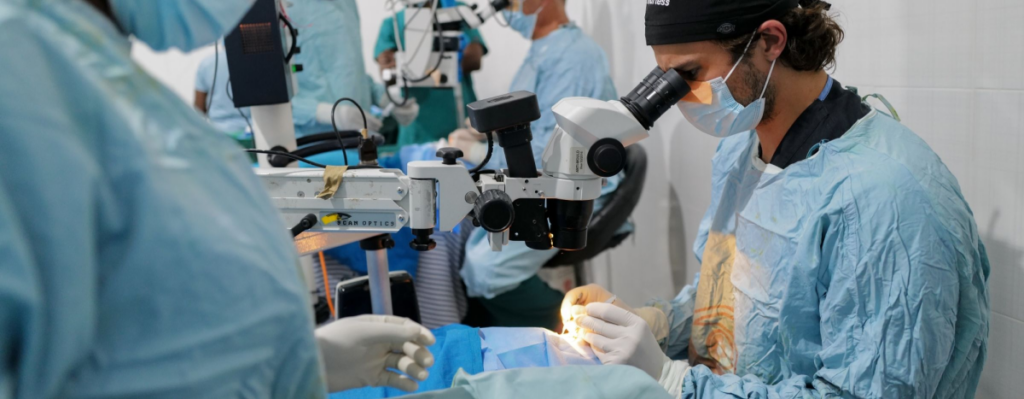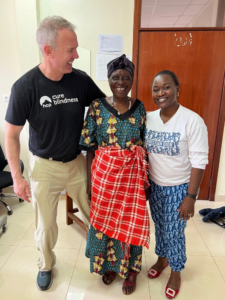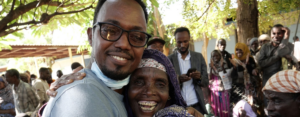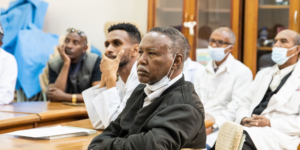As the Cure Blindness Project global fellow, Dr. Sean Collon spent the year working in sub-Saharan Africa under the mentorship of Dr. Geoff Tabin. The year-long fellowship in partnership with Stanford University selects top-in-class, early-career ophthalmologists to spend twelve months learning and teaching in the global eye health space. The experience is like none other. Dr. Collon shares his thoughts.

First published August 28, 2024 by the Cure Blindness Project
“An interesting phenomenon occurs when you start a global ophthalmology fellowship. While the focus of the trainee in all other realms is primarily, almost solely, on the quality of their training, in global ophthalmology the focus shifts to what the trainee will do for others—global partners, residents abroad, and others. It is a valuable shift towards an ostensibly less self-centered orientation, but I have struggled with it.
“My ambitions to make what I consider to be meaningful contributions to my hosts have often been trampled by the realities of poverty, corruption, poor infrastructure, and weak healthcare systems. I have self-consciously felt that, despite this shift in mentality in my new role as a global fellow, I have ultimately taken more than I have given.
“A recent trip to Ghana gave me some much-needed clarity. I saw a patient in clinic with severely swollen optic nerves, no light perception in one eye and 6/12 vision in the other. She had had a CT to look for signs of elevated intracranial pressure, which was read as normal, and her swollen nerves were attributed to her hypertension, which was being managed.
“I looked at her scans myself and the signs of elevated intracranial pressure were perfectly clear—the read was wrong, and a repeat radiology consultation confirmed this. We began interventions to lower her intracranial pressure that day in clinic, and I could not help thinking that even if all my big projects and ideas for the year failed, if I prevented this woman from going blind, or worse, my time in Ghana would have been justified. Amidst numerous other frustrations, I found comfort in that.

“She died the day I got back to America. She was 41 years old with 5 children. Nobody will ever know why she died—she had been lost to follow-up and bounced between hospitals, and one day started having trouble breathing—but she almost certainly would have lived in America. The notion that I had saved a life was an illusion, and an arrogant one, the same as the notion that I had cured anyone of blindness in outreach settings, because in medicine today individuals do not do much of anything on their own.
“Health care systems, comprising innumerable relationships between doctors, nurses, medical staff, politicians, patients, their families, and so many others, save lives and cure or prevent blindness, or fail to. Paradoxically, the ambition to personally have some grand impact on another place or person turns out to be its own form of self-centeredness.
“I recalled another conversation with a friend and mentor in Ghana about ambition and making an impact. ‘You Americans…’ he began, observing that we often fail to see value unless we can measure it or publish it. I had brought a perspective that was new to many of the trainees at Komfo Anokye, I would take new perspectives home with me, and I had formed and strengthened meaningful relationships. To his thinking, that more than justified my visit.
“I saw that woman with the swollen optic nerves with a resident who had seen her before. I taught that resident about looking for an empty sella on CT, and the importance of always reviewing scans yourself. She taught me about the realities of being a patient or provider in Ghana. And together, we spent a long time talking about blindness, inequality, and why we do what we do. I believe that relationships like this are the driving force behind the gradual progress towards a world where patients like ours ultimately survive. I cannot prove this, and I cannot quantify it, but more than anything else, this is what I will take away from my year as a global ophthalmology fellow.”
Learn more about the Cure Blindness Project by visiting their website at www.cureblindness.org. To never miss a story, subscribe to their monthly newsletter. The sign-up form is on the website home page.
[Editor’s note: HCP Cureblindness is now known as the Cure Blindness Project. Read more about this change here: HCP Cureblindness Rebrands as Cure Blindness Project.]
Related Articles

Cure Blindness Project Volunteer Wins Humanitarian Award
Long-time Cure Blindness Project volunteer ophthalmologist Dr. Sam Cady received the 2024 Alumni Humanitarian Award at Upstate Medical University (Norton College of Medicine) as part of their September alumni celebrations.

Ophthalmic Nurses Are the Heart of Our Outreaches
Cure Blindness Project board chair Dr. Matt Oliva calls the ophthalmic nurses he works alongside in Ethiopia the “real heroes” of high volume outreaches. These trained healthcare workers manage patient flow, prep patients for surgery, reassure anxious patients and assist doctors.

Talented Doctor Brings Wealth of Experience to Eritrea
An unexpected path leads Dr. Babiker to HCP Cureblindness and its mission to build local capacity in Eritrea.
